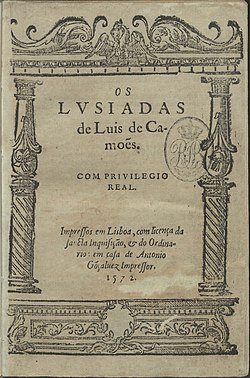Portuguese literature
Portuguese literature is the literature written in the Portuguese language, particularly by citizens of Portugal; it may also refer to literature written by people living in Portugal, Brazil, Angola and Mozambique, and other Portuguese speaking countries.
Examples
An early example of Portuguese literature is the tradition of a medieval Galician-Portuguese poetry. This tradition developed in Galicia and northern Portugal.[1]
The literature of Portugal is told apart by several aspects:
- a variety of lyric poetry,
- historical writing recording Portugal's rulers, conquests, and expansion
- by the Golden Age of the Renaissance period. On this period we find several of the most famous Portuguese writers such as Gil Vicente, Bernardim Ribeiro, Sá de Miranda and especially Luís de Camões, author of the national and epic poem Os Lusíadas (The Lusiads).
History
The seventeenth century is generally seen as the century of literary decadence, despite the existence of writers like Father António Vieira, Padre Manuel Bernardes and Francisco Rodrigues Lobo.
The writers of the eighteenth century tried to oppose a certain decadence of the baroque stage by making an effort to recover the level of quality reached during the Golden Age. This was done through the creation of academies and literary Arcadias - it was the time of Neoclassicism. In the nineteenth century, the neoclassical ideals were abandoned, where Almeida Garrett introduced Romanticism, followed by Alexandre Herculano and Camilo Castelo Branco.
In the second half of the nineteenth century, Realism (of naturalistic features) developed in novel-writing, whose exponents included Eça de Queiroz and Ramalho Ortigão. Literary trends during the twentieth century are represented mainly by Fernando Pessoa, believed one of the greatest national poets together with Camões. In later years, we can see the development of prose fiction, thanks to authors such as António Lobo Antunes and José Saramago, winner of the Nobel prize for Literature.
Some of the most important books of the Portuguese literature
|
|
|
|
|
Poetry
|
Theatre
|
Essay
|
Portuguese Literature Media
The Pergaminho Sharrer ("Sharrer Parchment"), containing songs by King Dinis I.
References
Writings on the subject
- Parkinson, Stephen, Cláudia Pazos Alonso, and T. F. Earle, eds. A Companion to Portuguese Literature. Woodbridge, Suffolk; Rochester, NY: Boydell & Brewer, 2009.
